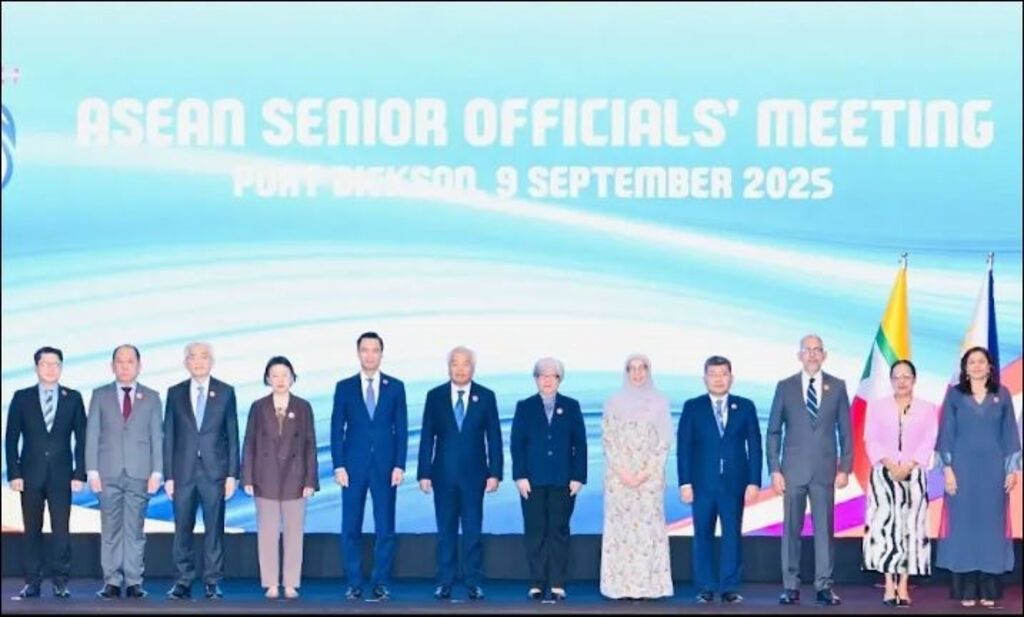 |
| Participants at the event__Photo: VNA |
Deputy Minister of Foreign Affairs Dang Hoang Giang has underscored Vietnam’s commitment to closely coordinating with ASEAN Chair 2025 Malaysia, fellow member states and partners to ensure the success of the 47th ASEAN Summit and related meetings slated for October.
Giang, head of Vietnam's ASEAN SOM, pledged as much at the Senior Officials’ Meetings (SOM) of ASEAN, ASEAN+3 and the East Asia Summit (EAS) that took place on September 9–10 in Port Dickson, Malaysia.
He emphasized the importance of maintaining ASEAN's unity, centrality and leadership in addressing both traditional and non-traditional security challenges, strengthening institutional capacity, and fostering synergy between ASEAN-led mechanisms to build a comprehensive and effective cooperation network serving the interests of the people.
He reaffirmed Vietnam’s readiness to support Timor-Leste in building capacity to soon fulfill its membership obligations, drawing on Vietnam’s 30-year membership.
The Deputy Foreign Minister also proposed measures to strengthen intra-bloc and ASEAN-partner cooperation, particularly in economic integration, connectivity, science and technology, digital transformation, and energy transition.
As Vietnam performs the role of country coordinator for ASEAN–New Zealand and ASEAN–UK relations, Deputy FM Giang suggested measures to advance cooperation with both partners, including drafting orientation documents and identifying priority areas of collaboration.
On regional and global issues, Giang reaffirmed Vietnam’s consistent support for dialogue, cooperation and peaceful settlement of disputes in accordance with international law, especially the 1928 United Nations Convention on the Law of the Sea (UNCLOS 1982), with the ultimate aim of maintaining peace, security and stability to foster development.
At the events, senior officials from the ten ASEAN member states, along with representatives from Timor-Leste and dialogue partners such as China, Japan, the Republic of Korea, the United States, India, Australia, New Zealand, and Russia, thoroughly reviewed the agenda and examined more than 80 draft documents to be submitted to the leaders.
Under ASEAN 2025's theme of “Inclusivity and Sustainability," leaders are expected to participate in nearly 40 activities covering strategic issues from politics and security to economic cooperation, connectivity, culture, digital transformation, energy and food security, education and innovation – with the shared goal of building an inclusive, sustainable and people-centered ASEAN.
The SOM discussed Timor-Leste’s admission as ASEAN’s 11th member in October and considered requests by new partners to join the Treaty of Amity and Cooperation (TAC).
Amid global challenges, members stressed stronger ASEAN resilience, closer coordination between its political-security and economic pillars, and synergy between ASEAN Vision 2045 and the UN 2030 Agenda.
With partners, ASEAN reiterated its central role in shaping regional cooperation, particularly in digital transformation, the green economy and energy transition.
At the ASEAN+3 SOM, China, Japan, and the Republic of Korea proposed initiatives in economic, financial, energy and food security, alongside projects on disaster management, transnational crime, women’s empowerment, child protection and climate adaptation.
At the EAS SOM, participants reaffirmed the forum’s 20-year role in addressing regional political and security issues, emphasizing dialogue, trust-building, international law, and a rules-based regional order with ASEAN at its core. Views were also exchanged on the East Sea, Myanmar and the Middle East, reaffirming peaceful settlement of disputes in line with international law, the UN Charter, and UNCLOS 1982, as well as the principles of the TAC.
On the sidelines of the meetings, Giang also held bilateral discussions with ASEAN SOM heads and partner representatives to discuss bilateral cooperation and enhance coordination at multilateral forums.- (VNA/VLLF)









